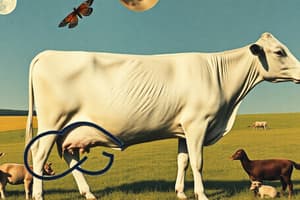Podcast
Questions and Answers
Why are essential fatty acids like omega-3 and omega-6 important in an animal's diet, and what can result from their deficiency?
Why are essential fatty acids like omega-3 and omega-6 important in an animal's diet, and what can result from their deficiency?
Essential fatty acids are necessary because animals cannot synthesize them on their own. They are crucial for hormone production and cell membrane structure. A deficiency can lead to poor growth, skin problems, and reproductive issues.
Explain how carbohydrates provide energy to animals and differentiate between the roles of simple and complex carbohydrates.
Explain how carbohydrates provide energy to animals and differentiate between the roles of simple and complex carbohydrates.
Carbohydrates are broken down into glucose, which is used for energy production. Simple carbohydrates provide quick energy, while complex carbohydrates offer a more sustained energy release.
Describe the primary functions of proteins in an animal's body, and list two potential consequences of protein deficiency?
Describe the primary functions of proteins in an animal's body, and list two potential consequences of protein deficiency?
Proteins are critical for building and repairing tissues, and for creating enzymes, hormones, and antibodies. Deficiency can result in poor growth and impaired immune function.
How do fat-soluble and water-soluble vitamins differ in terms of storage and excretion, and why is this distinction important?
How do fat-soluble and water-soluble vitamins differ in terms of storage and excretion, and why is this distinction important?
Explain why water is considered an essential nutrient, detailing at least three critical physiological processes in which it is involved.
Explain why water is considered an essential nutrient, detailing at least three critical physiological processes in which it is involved.
Briefly describe the roles of calcium and phosphorus in animal nutrition, and explain how a deficiency in either mineral might manifest.
Briefly describe the roles of calcium and phosphorus in animal nutrition, and explain how a deficiency in either mineral might manifest.
What is the significance of Vitamin D in animal nutrition, and how does it relate to calcium?
What is the significance of Vitamin D in animal nutrition, and how does it relate to calcium?
Explain the role of antioxidants like Vitamin E and Selenium in animal nutrition, relating their function to overall health.
Explain the role of antioxidants like Vitamin E and Selenium in animal nutrition, relating their function to overall health.
Describe the importance of the micro-minerals iron and iodine in animal nutrition, detailing their specific roles.
Describe the importance of the micro-minerals iron and iodine in animal nutrition, detailing their specific roles.
How can excessive intake of certain minerals or fat-soluble vitamins lead to toxicity in animals, and why is it a concern?
How can excessive intake of certain minerals or fat-soluble vitamins lead to toxicity in animals, and why is it a concern?
Flashcards
Feed Nutrients
Feed Nutrients
Essential substances for survival, growth, reproduction, and health. Includes water, carbs, fats, proteins, vitamins, and minerals.
Water
Water
Essential nutrient for temperature regulation, nutrient transport and waste elimination.
Carbohydrates
Carbohydrates
Primary energy source composed of sugars, starches, and fiber.
Fats (Lipids)
Fats (Lipids)
Signup and view all the flashcards
Proteins
Proteins
Signup and view all the flashcards
Vitamins
Vitamins
Signup and view all the flashcards
Minerals
Minerals
Signup and view all the flashcards
Macro-minerals
Macro-minerals
Signup and view all the flashcards
Micro-minerals
Micro-minerals
Signup and view all the flashcards
Study Notes
- There are six basic feed nutrients: water, carbohydrates, fats, proteins, vitamins, and minerals
- These nutrients are essential for an animal's survival, growth, reproduction, and overall health
- Animals obtain these nutrients through their diet, and each nutrient plays a specific role in the body
Water
- Water is an essential nutrient involved in numerous physiological processes, including temperature regulation, nutrient transport, and waste elimination
- It is the most abundant component of an animal's body
- Animals obtain water from drinking, food, and metabolic processes
- Water aids in digestion, absorption, and excretion
- It helps maintain proper electrolyte balance
- Water serves as a solvent for various biochemical reactions
- Deficiency can lead to dehydration with signs of reduced performance, and in severe cases, death
Carbohydrates
- Carbohydrates are the primary source of energy for animals and are composed of sugars, starches, and fiber
- They are broken down into glucose, which is used for energy production
- Sources include grains, forages, and fruits
- Simple carbohydrates (sugars) provide quick energy. Complex carbohydrates (starches and fibers) offer a more sustained energy release
- Fiber is important for digestive health, particularly in ruminants
- Excess carbohydrates can be stored as fat
Fats
- Fats (lipids) are a concentrated source of energy, providing more than twice the energy of carbohydrates per unit weight
- They are essential for hormone production, insulation, and protection of organs
- Fats aid in the absorption of fat-soluble vitamins (A, D, E, and K)
- Sources include oils, seeds, and animal fats
- Essential fatty acids (e.g., omega-3 and omega-6) must be obtained through the diet
- Deficiency can lead to poor growth, skin problems, and reproductive issues
- Excess fat intake can lead to obesity
Proteins
- Proteins are critical for building and repairing tissues, enzymes, hormones, and antibodies
- They are composed of amino acids, some of which are essential and must be supplied in the diet
- Sources include meat, milk, eggs, legumes, and oilseed meals
- Protein quality depends on the amino acid profile and digestibility
- Ruminants can synthesize some amino acids through microbial action in the rumen
- Deficiency can result in poor growth, muscle wasting, and impaired immune function
- Excessive protein intake can strain the kidneys and liver
Vitamins
- Vitamins are organic compounds required in small amounts for various metabolic processes and overall health
- They are classified as either fat-soluble (A, D, E, and K) or water-soluble (B vitamins and vitamin C)
- Fat-soluble vitamins are stored in the body, while water-soluble vitamins are excreted more readily
- Sources include a variety of foods, and some vitamins can be synthesized by the animal or by rumen microbes
- Vitamin A supports vision, immune function, and cell growth
- Vitamin D is essential for calcium absorption and bone health
- Vitamin E acts as an antioxidant and supports immune function
- Vitamin K is important for blood clotting
- B vitamins play a role in energy metabolism
- Vitamin C is an antioxidant and supports immune function
- Deficiency symptoms vary depending on the specific vitamin but can include poor growth, skin problems, and neurological issues
- Excessive supplementation can sometimes lead to toxicity, especially with fat-soluble vitamins
Minerals
- Minerals are inorganic substances needed for various physiological functions, including bone formation, enzyme activity, and electrolyte balance
- They are classified as macro-minerals (required in larger amounts) and micro-minerals (trace minerals, required in smaller amounts)
- Macro-minerals include calcium, phosphorus, magnesium, sodium, potassium, chlorine, and sulfur
- Micro-minerals include iron, zinc, copper, manganese, iodine, selenium, and cobalt
- Calcium and phosphorus are essential for bone and teeth formation
- Sodium, potassium, and chlorine are important for fluid balance and nerve function
- Magnesium is involved in enzyme activity and muscle function
- Sulfur is a component of certain amino acids and vitamins
- Iron is needed for oxygen transport in the blood
- Zinc is involved in enzyme activity, immune function, and wound healing
- Copper plays a role in enzyme activity and iron metabolism
- Manganese is important for enzyme activity and bone development
- Iodine is required for thyroid hormone synthesis
- Selenium acts as an antioxidant and is important for immune function
- Cobalt is a component of vitamin B12, essential for red blood cell formation
- Mineral deficiencies can lead to various health problems, including skeletal abnormalities, anemia, and impaired immune function
- Mineral toxicities can occur with excessive supplementation
Studying That Suits You
Use AI to generate personalized quizzes and flashcards to suit your learning preferences.




